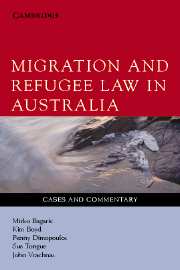Book contents
- Frontmatter
- Contents
- Detailed table of contents
- Table of cases
- Table of statutes
- 1 Thinking about migration law and national borders: An aspirational benchmark?
- 2 Introduction to Australian immigration law
- 3 Family and interdependency visas
- 4 Business and investment and skill-based visas
- 5 Temporary visas
- 6 Miscellaneous visas
- 7 Common visa requirements
- 8 Introduction to Australian refugee law: The Refugees Convention in Australian domestic law
- 9 Convention grounds
- 10 Persecution
- 11 Well-founded fear of persecution
- 12 Limits on protection of refugees: Cessation, exclusion exceptions and protection by another country
- 13 Cancellation of visas
- 14 Judicial review
- 15 Migration and human rights
- Index
11 - Well-founded fear of persecution
Published online by Cambridge University Press: 05 June 2012
- Frontmatter
- Contents
- Detailed table of contents
- Table of cases
- Table of statutes
- 1 Thinking about migration law and national borders: An aspirational benchmark?
- 2 Introduction to Australian immigration law
- 3 Family and interdependency visas
- 4 Business and investment and skill-based visas
- 5 Temporary visas
- 6 Miscellaneous visas
- 7 Common visa requirements
- 8 Introduction to Australian refugee law: The Refugees Convention in Australian domestic law
- 9 Convention grounds
- 10 Persecution
- 11 Well-founded fear of persecution
- 12 Limits on protection of refugees: Cessation, exclusion exceptions and protection by another country
- 13 Cancellation of visas
- 14 Judicial review
- 15 Migration and human rights
- Index
Summary
According to Chan v MIEA, the expression ‘well-founded fear of persecution’ contains both objective and subjective elements that must be satisfied before a person can be found to be a refugee. That is, the person must genuinely fear being persecuted, and his or her fear must have an objective basis.
Consistent with general administrative law principles, a decision-maker must decide whether an applicant has a ‘well-founded’ fear of being persecuted as at the date of the decision – not, for instance, as at the date that the applicant left his or her country nor at the date of the protection visa application.
In Chan's case, mason cj stated:
Chan v MIEA
I agree with the conclusion reached by mchugh j. that a fear of persecution is ‘well founded’ if there is a real chance that the refugee will be persecuted if he returns to his country of nationality … I prefer the expression ‘a real chance’ because it clearly conveys the notion of a substantial, as distinct from a remote chance, of persecution occurring … If an applicant establishes that there is a real chance of persecution, then his fear, assuming that he has such a fear, is well-founded, notwithstanding that there is less than a fifty percent chance of persecution occurring. This interpretation fulfils the objects of the Convention in securing recognition of refugee status for those persons who have a legitimate or justified fear of persecution on political grounds if they are returned to their country of origin.
- Type
- Chapter
- Information
- Migration and Refugee Law in AustraliaCases and Commentary, pp. 324 - 342Publisher: Cambridge University PressPrint publication year: 2006

